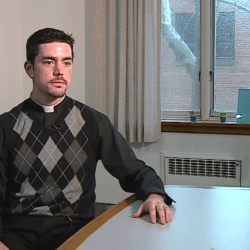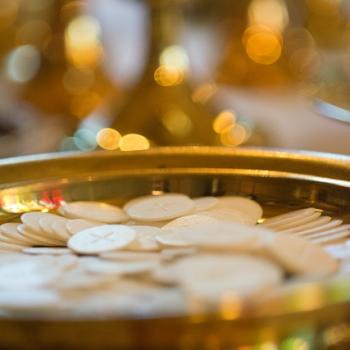You probably remember this story about the priest from Florida who took his own life.
Below, the homily delivered at the priest’s funeral on Monday by Bishop Robert Lynch.
There are three things that are for certain in every human life: birth, death and taxes. While we ourselves are responsible for the third, our taxes, our staunchly pro-life teaching has always held and argued that God alone is the author of all human life and God alone is to be the determiner of when life begins and when it ends.
Our Father Vladimir, however, a week ago chose both the time and the manner of his departure from our midst and the end of his life. This morning we may think we know of the contributing factors of his decision, but none of us is gifted with the power to see into his mind, his thinking, and his decision-making last Sunday night and Monday morning a week ago. No amount of money is worth the taking of a human life, no amount of shame can ever completely erase the good a person has done, no sin is truly unpardonable, no potential embarrassment even approaches the shame, anger, guilt which befalls those left behind to deal with the unforeseen reality occasioned by suicide. I want everyone here present this morning, the children of the parish and in the school to know that the single act which brings us together this morning is wrong.
The act, however, can at times be severable from the person. For all of his priestly life, Father Vladimir put himself at the service of the Lord Jesus, serving in missionary territory in Venezuela prior to coming to the United States and to our local Church. In the years he was here, he endeared himself to God’s people. At Most Holy Name of Jesus parish, they cared for him enough that they gave him time to improve his English and when the Church became vacant they asked that he be made their shepherd. He was happy there, serving God’s people and loving in a special way the Hispanic population he was linguistically better prepared to minister to.
When I asked him three years ago to come to St. Joseph’s to succeed the beloved Father Felix, he did not hesitate. He came. It was not easy for him. There was the school which had been losing money and enrollment for many years and a whole new effort begun by the University of Notre Dame to not just save the school but to build it up. He lived to see that happen. There were walls to be painted in the Church and at times he was more difficult and demanding of the artist painting than Pope Julius was of Michelangelo applying fresco to the Sistine Chapel. Through it all, mostly alone, he heard your confessions, celebrated Mass for you in two languages, baptized your children, and anointed your sick. On two occasions he told Monsignor Morris and I how much he loved St. Joseph parish and that it was an honor to be your pastor. Publicly all seemed well. Internally what some of us knew to be true was that dear Father Vladimir suffered bouts of depression although in recent years he showed signs of improvement and greater control.
However, little known to most and unknown to me, there was an affliction within him called an addiction, which first came to light less than two weeks ago. Addictions are not always sinful. To be sinful, in classic moral theology, three things are necessary: grave matter (taking a loaf of bread from the super market to feed one’s starving family, though I do not recommend it, is not grave matter but taking large sums of money is); second, one must know and understand the gravity of the act (since addictive behavior is often repetitive behavior, this requirement for serious sin can sometimes be missing); third and finally, in performing the sinful act one must willfully and knowingly intend to break God’s law and the harmonious relationship between ourselves and our God and fellow women and men.
Neither you nor I this morning are in a position to judge Father’s actions. He did not give us a chance to do so. But all three readings from Scripture remind us that our God is merciful, loving, compassionate and forgiving. The task of judgment passes from our minds and hands to Our Lord’s. Less than fifty years ago, a funeral Mass for a victim of suicide was not allowed by our Church and priests were not even allowed to pray over the caskets of the dead. The Church and society have embraced the notion that mental illness often causes people to do the unexplainable and what was once considered a capital sin remains wrong but can be an occasion for mercy, a call to pardon, a sign of love. We gather this morning not as investigative reporters but people of faith.
Allow me to speak just for myself for just a moment. The past week has seen my emotions run the gamut from anger to guilt, from disbelief to compassionate concern for Father’s family in Poland and in West Tampa, from shame to sorrow, and usually back to guilt. On Saturday morning I rejoiced at the ordination of our three new priests, but I could not rid myself of the image of “the one who got away and how I wished I could have taken him back.” And I am sure that many of you have shared the same thoughts and the same feelings. A leader of belief, a shepherd of souls, a model of Christian living and loving, chose to end his life and leave the rest to us.
Now we must leave the rest to God. There is no reason why we can not remember Father for all the good that he has done but there is no reason why we could or should embrace the manner in which he chose to leave us. Hoping and praying that he died in the Lord, we can embrace the words of the writer of the Book of Revelation, “Yes. . .let [him] find rest from [his] labors, for [his] works accompany [him]. Rev.14.13. As Wisdom says in the first reading: He who pleased God was loved; he who lived among sinners was transported, snatched away, less wickedness pervert his mind or deceit beguile his soul. For the witchery of paltry things obscures what is right, and the whirl of desire transforms the innocent mind.” Wis.4:11-13.
It is my duty as your bishop to assure you that we can pray for Father Vladimir confident that God will judge him justly. It is also my duty to draw the distinctions between right and wrong and in a proper time and manner to share with you what I know when I know it about what has and can be done to right the wrong, which was done. But it is also my duty as your bishop to say to Father Vladimir and to his family, despite all this, we are grateful for his better times and better moments among us and we send you our love and sympathy as we commend his soul to God, the most high. Eternal rest grant unto you, Vladimir, and may perpetual light shine upon you.











